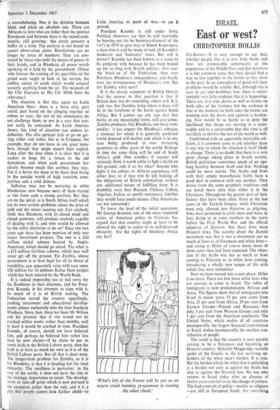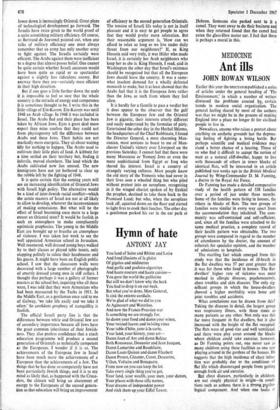East or west?
ISRAEL CHRISTOPHER HOLLIS
Ein-Karem—lt is easy enough to say that, whether people like it or not, both Arabs and Jews are irremovable constituents of the population of the Middle East and that therefore it is but common sense that they should find a way to live together in the future as they have in the past. In an atmosphere of good will their problems would be soluble. But, although this is easy to say and doubtless true, there is unfor- tunately very little evidence that it is happening. There are, it is true, doves as well as hawks on both sides of the frontiers but the evidence is that at the moment on both sides the hawks are winning over the doves and opinion is harden- ing. Few would be so hardy as to deny the likelihood that things are moving to a catas- trophe and to a catastrophe that this time is all too likely to involve the rest of the world as well.
Confronted with an apparently inevitable col- lision, it is common sense to ask whether there is any way in which the situation is itself likely to change. There is no doubt that there is a very great change taking place in Israeli society. British politicians sometimes speak of an age- long hostility between Arab and Jew. Nothing could be more untrue. The Arabs and Jews with their simple monotheistic faiths have a good deal in common with one another. They derive from the same prophetic traditions and are much more akin than either is to the Christians. Throughout the greater part of their history they have been allies. Even in the last years of the Turkish Empire, while Christians were only allowed into Palestine as pilgrims, Jews were permitted to settle there and were, in fact, doing so in some numbers in the years before the First World War and the official adoption of Zionism. But these Jews were Oriental Jews. The novelty about the Zionist movement was that it was a movement not so much of Jews as of European and white Jews— and owing to Hitler of course many more of them came than had been expected. The objec- tion of the Arabs was not so much to Jews coming to Palestine as to white Jews coming, introducing a wholly new tempo of life with which they were unfamiliar.
Now we have moved into a new phase. Hitler is no more. There are few more white Jews who are anxious to come to Israel. The influx of immigrants is now predominantly African and Asian. The figures show that of immigrants into Israel in recent years 13 per cent come from Asia, 21 per cent from Africa, 29 per cent from Eastern Europe—Poland and Rumania—but only 3 per cent from Western Europe and only 1 per cent from the American continents. The United States, which makes of all countries incomparably the largest financial contribution to Israel, makes incomparably the smallest con- tribution of people.
The result is that the country is very quickly ceasing to be a European and becoming an Oriental country. Malcolm Muggeridge recently spoke of the Israelis as the last surviving up- holders of the white man's burden. It is true. But the burden which the white Jew is upholding is a burden not only as against the Arabs but also as against the Oriental Jew. No one who returns to Israel today after an absence of twelve years can fail to see the change of pattern. The high controls of policy—secular or religious —are still in European hands, but everything lower down is increasingly Oriental. Great plans of technological development go forward. The Israelis have twice given to the world proof of a quite astonishing military efficiency. Of course, as Bertrand de Jouvenel pointed out, when one talks of military efficiency one must always remember that an army has only another army to fight against. The Israelis certainly were efficient. The Arabs against them were inefficient to a degree that almost passes belief. One cannot be quite certain whether Israeli successes would have been quite so rapid or so spectacular against a slightly less ridiculous. enemy. But anyway there they are—certainly most efficient in their high direction.
But if one goes a little further down the scale it is impossible to feel so sure that the whole country is the miracle of energy and competence it is sometimes thought to be. I write this in the little village of Ein-Karem. Ein-Karem was until 1948 an Arab village. In 1948 it was included in Israel. The Arabs fled and their place has been taken by African Jews. Eyes a great deal more expert than mine confess that they could not from physiognomy tell the difference between Arabs and these Jews. Their habits are not markedly more energetic. They sit about waiting idly for nothing to happen. The Arabs used to cultivate their little plots of land. A kibbutz for a time settled on their territory but, finding it infertile, moved elsewhere. The land which the Arabs cultivated now lies unused. The new immigrants have not yet bothered to clear up the rubble left by the fighting of 1948.
It is quite certain that the coming years will see an increasing identification of Oriental Jews with Israeli high policy. The alternative would be a kind of inter-Jewish racial conflict—which the astute masters of Israel are not at all likely to allow to develop, whatever the inconveniences of making concessions. But what will be the effect of Israel becoming once more to a large extent an Oriental state? It would be foolish in such an atmosphere to make complacently optimistic prophecies. The young in the Middle East. are brought up to breathe an atmosphere of violence. I was taken last week to see the well appointed Armenian school in Jerusalem.
Well mannered, well dressed young boys walked by to their classes or played table tennis, only stopping politely to salute their headmaster and his guests. It might have been an English public school. I saw that the classroom walls were decorated with a large number of photographs of smartly dressed young men in stiff collars. I thought that perhaps it was a gallery of former masters at the school but, inquiring who all these were, I was told that they were Armenians who had been massacred by the Turks in 1911. In the Middle East, as a gentleman once said to me of Galway, 'we take life easily and we take it often.' So confident prophecy of tranquillity is foolish. • The official Israeli party line is that the differences between white and Oriental Jew are of secondary importance because all Jews have the great common inheritance of their Jewish- ness. They also profess confidence that a crash education programme will produce a second generation of Orientals as technically competent as the Europeans. I wonder if it is so. The achievements of the European Jew in Israel have been much more the achievements of a European than the achievements of a Jew. The things that he has done so competently have not been particularly Jewish things, and it is to my mind as likely that, as happened with the Crusa- ders, the climate will bring an abatement of energy to the Europeans of the second genera- tion as that education will bring an improvement of efficiency to the second generation Orientals. The tension of Israeli life today is not in itself pleasant and it is easy to get people to agree that they would prefer more relaxation. But their reasonable argument is, 'How can we afford to relax so long as we live under daily threat from our neighbours?' If, as King Hussein said very truly, it was Hitler who made Israel, it is certainly her Arab neighbours who keep her as she is. King Hussein, I read, said in Washington the other day that Israel's existence should be recognised but that all the European Jews should leave the country. It was a some- what insolent demand for a wholly defeated monarch to make, but it at least showed that the Arabs feel that it is the European Jews rather than the Jews as such from whom they feel alien.
It is hardly for a Gentile to pass a verdict but it does appear to the observer that tfie gulf between the European Jew and the Oriental Jew is gigintic, their interests utterly different and easily underrated by the formulae of piety. Entertained the other day in the Hechal Shlomo, the headquarters of the Chief Rabbinate, I found the Director General, a most charming Man- cunian, most anxious to boast to me of Man- chester United's victory over Liverpool on the previous Saturday. I cannot feel that there were many Moroccan or Yemeni Jews or even the more sophisticated from Egypt or Iraq who shared his interest. Israel is a country of strangely varying cultures. Most people know the old story of the Yemenis who had never in their lives seen a wheeled thing but who piled without protest into an aeroplane, recognising in it the winged chariot spoken of by Ezekiel the prophet, destined to take them back to the Promised Land; but who, when the aeroplane took off, squatted down on the floor and started to light fires to cook their lunches. The other day a gentleman parked his car in the car park at Hebron. Someone else parked next to it a camel. They went away to do their business and when they returned found that the camel had eaten the glass-fibre motor car. I feel that there is perhaps a moral in-this.



































 Previous page
Previous page